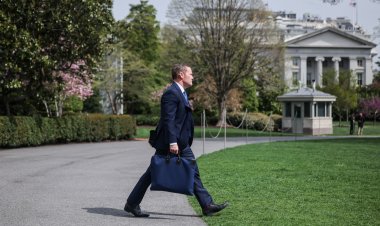Wall Street magnates resist Trump's trade policies
JPMorgan CEO Jamie Dimon cautioned that the ongoing global conflict has the potential to undermine the economic alliances that have positioned the U.S. as the world’s most powerful nation.

As U.S. financial markets brace for another potential downturn and Trump remains steadfast in his commitment to tariffs, JPMorgan Chase CEO Jamie Dimon warned investors that ongoing trade conflicts could jeopardize the economic partnerships that have solidified the U.S.’s position as a leading global power. Goldman Sachs Chief Economist Jan Hatzius raised the probability of a U.S. recession to 45 percent. Even Bill Ackman, the hedge fund billionaire and prominent Trump supporter on Wall Street, expressed concern that the president’s ability to manage the trade conflict could diminish if the markets continue to decline.
“It does not help our country’s and our president’s negotiating position to be trying to strike deals while our market is collapsing,” Ackman posted on X on Sunday night as futures markets plummeted. “Whoever is recommending that idea to President @realDonaldTrump should be fired right now.”
The recent stock market crash, which wiped out trillions of dollars from Wall Street portfolios, retirement funds, and public pensions, shows signs of persisting as investors confront a White House intent on drastically altering the global economic landscape under the guise of fairness. Asian stocks experienced notable drops overnight.
The S&P 500, which had rallied following Trump’s election, is projected to open down more than 20 percent from the peak it reached just six weeks ago. The tech-heavy Nasdaq and Dow Jones Industrial Average are also at risk of significant drops, and in an unusual departure from standard market behavior, investors are liquidating traditionally safe assets like the U.S. dollar and gold.
"I've been around a number of times when events led everybody to focus on how circuit breakers work," former Treasury Secretary Larry Summers commented in an interview, referencing the mechanisms that suspend stock trading during steep declines. "Never has the event in question been the action of the president of the United States."
As stock market futures declined Sunday night, Trump told reporters aboard Air Force One that he doesn’t “want anything to go down, but sometimes you have to take medicine to fix something.”
“What’s going to happen to the markets, I can’t tell you. But our country is much stronger,” he asserted. Trump argues that U.S. trading partners, many of whom maintain surpluses, are treating American companies unjustly through tariff and non-tariff barriers. He also aims to incentivize more companies to manufacture their products in the U.S.
The president's trade policy has served as a harsh awakening for Wall Street traders, who had assumed he would be swayed by market forces in policymaking. Although he has been clear about his plans to impose universal tariffs on key trading partners, many investors had previously dismissed the prospect of a full-scale trade war, instead focusing on potential economic boosts from deregulation, reduced energy prices, and tax cuts.
Now, however, they are faced with a tariff environment that threatens not only their profits but also the global economic structure.
On Monday, Dimon expressed to investors that his primary concern regarding Trump's tariffs is “how this will affect America’s long-term economic alliances.” He noted that the administration's protectionist trade strategy could provoke retaliation and undermine confidence in the U.S. economy, its markets, and the dollar, as detailed in his letter to shareholders.
“The quicker this issue is resolved, the better because some of the negative effects increase cumulatively over time and would be hard to reverse,” Dimon commented. “I am hoping that after negotiations, the long-term effect will have some positive benefits for the United States.”
Stanley Druckenmiller, a former hedge fund executive and associate of Treasury Secretary Scott Bessent, stated on Sunday that he opposed any tariffs exceeding 10 percent. Meanwhile, Clifford Asness, a longtime Republican donor and head of AQR Capital Management, criticized the policies' Republican supporters as "feckless toadies willing to say the most ignorant things to please their dear leader."
It remains uncertain how swiftly negotiations with foreign governments might lead to outcomes that could change Wall Street's perspective. Administration officials indicated that as many as 50 countries have reached out to negotiate new trade agreements prior to the implementation of tariffs on April 9. However, Bessent and Commerce Secretary Howard Lutnick suggested in separate television appearances that these negotiations could be protracted.
“It's not the kind of thing you can negotiate away in days or weeks,” Bessent stated on NBC’s “Meet the Press.”
The longer negotiations take, the higher the risk of a recession. In an investor note, Hatzius highlighted that the “sharp” tightening of financial conditions—coupled with overseas boycotts of U.S. goods and retaliatory measures from other governments—could exacerbate the impacts of the trade war.
“If the White House does implement most or all of the April 9 tariffs, the effective tariff rate will climb by about 20 percentage points,” Hatzius wrote. Goldman Sachs, alongside most banks, has cautioned that elevated tariff rates will lead to slower growth and increased inflation.
If Trump goes ahead with the tariffs on April 9, “we expect to change our baseline to forecast a US recession,” Hatzius noted.
Ian Smith for TROIB News
Find more stories on Business, Economy and Finance in TROIB business












